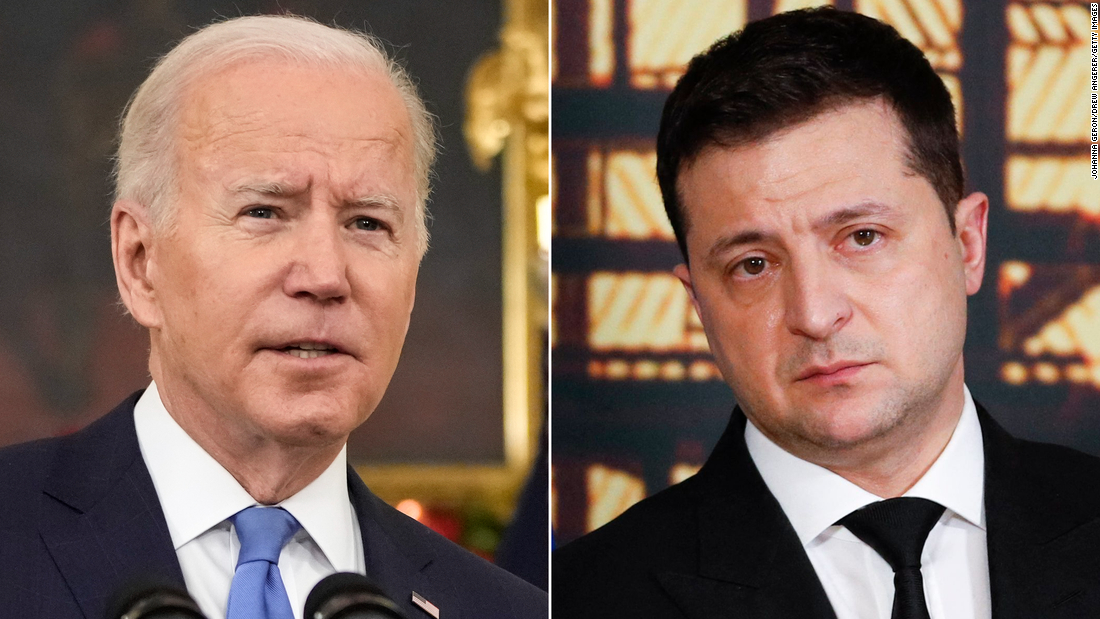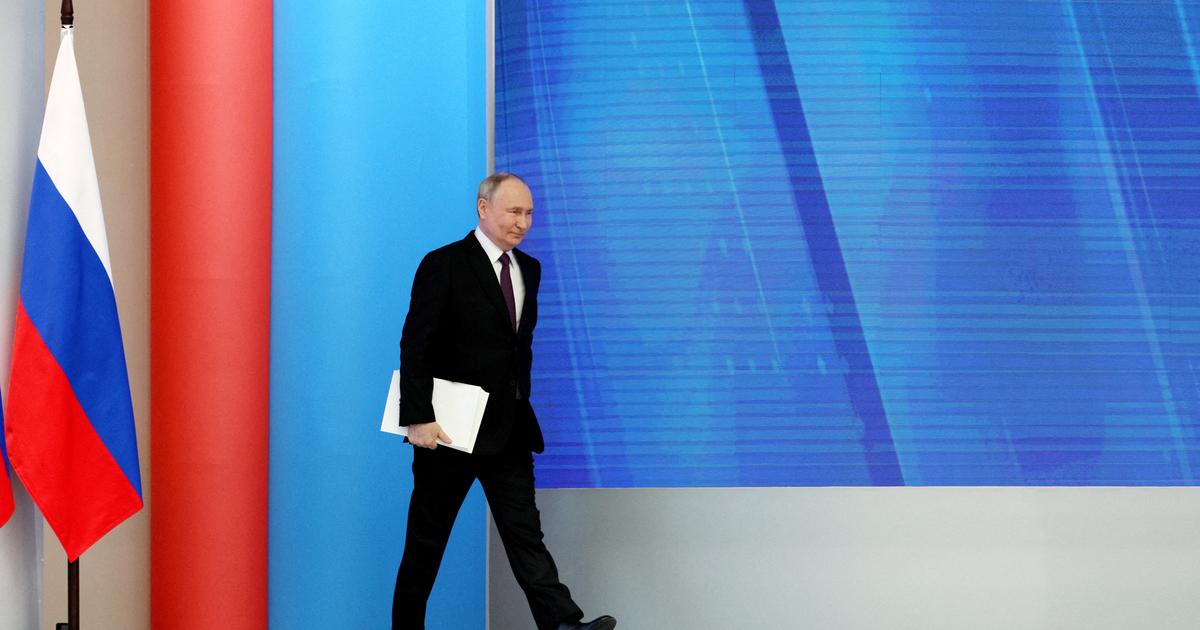This is how life is in Ukraine amid tensions 0:48
(CNN) --
New signs of disagreement between the United States and Ukraine over a possible Russian invasion could seriously undermine President Joe Biden's force-based stance against Vladimir Putin in their escalating standoff.
Frustration in Kyiv has grown in recent days over escalating US rhetoric about the crisis, even as Moscow sends more troops to positions near the Ukrainian border.
Washington and its allies have waged an unusually open and vocal public relations campaign, an approach that seems rooted primarily in genuine fears of a major conflagration in Ukraine.
Crisis between Ukraine and Russia: When could a war start and what would it look like?
But there are clear signs that the strategy is also designed to put pressure on Putin and sharpen his strategic dilemma, while forcing America's allies in Europe to take tougher stances.
It can provide political cover for Biden by showing that he has not been caught off guard if Russia invades.
The strategy also protects the president, who is reeling in his country, from attacks by Republican hawks eager to cast him as a weak appeaser ahead of the midterm elections.
US President Joe Biden and his Ukrainian counterpart Volodymyr Zelensky.
However, it also threatens to spark a clash between Biden's broader interests and those of Ukraine's President Volodymyr Zelensky, who is trying to keep calm at home even as he tries to drum up arms and international support for his country's defense.
A phone call that "didn't go well"
A call between Zelensky and Biden, on Thursday, should have served to reach an agreement.
But the Ukrainians made it known in advance that they would ask the US president to tone down his rhetoric.
After the leaders spoke, a senior Ukrainian official told CNN's Matthew Chance in Kyiv that the call "didn't go well" and that Zelensky had asked his American counterpart to "calm down his messages" while arguing that the Russian threat it was still ambiguous.
advertising
According to the Ukrainian official, Biden warned that an invasion was now virtually certain once the ground freezes in February, making it more passable for military vehicles.
National Security Council spokeswoman Emily Horne disputed the version of the call, saying "anonymous sources are leaking falsehoods."
She pointed out that Biden had warned that a February invasion was a possibility, a position she said she had taken for months.
Zelensky's spokesman also disputed the Ukrainian official's characterization of the call.
The Ukrainian president himself tweeted that he and Biden had a long call and "discussed recent diplomatic efforts on de-escalation and agreed on joint actions for the future."
Students attend emergency drill in Ukraine 0:48
Whatever the details of the private conversation, it's no secret that the United States and Ukraine have publicly disagreed about the magnitude of the threat.
The Kyiv government, for example, was caught off guard earlier this week when the State Department said it would reduce staffing levels at the US embassy, starting with the departure of non-essential staff and families of the diplomats.
The disconnect is remarkable between two friendly governments and reflects how much is at stake right now. It is also a rare public drama, as a nation under the seemingly imminent threat of invasion has a lower assessment of its own vulnerability than the United States, which has mounted an international effort to defend itself. And what is more damaging, signs of a public disagreement between Biden and Zelensky would play directly in favor of Russia. Moscow has already highlighted Ukraine's more tempered position to argue that Washington is exploiting the country to escalate against Russia. In fact, the opposite is happening, as Putin is holding Ukraine hostage in an attempt to wrest concessions from Biden that would change post-Cold War Europe.
Suggestions that the United States and Ukraine are on a different page when it comes to the likelihood of a Russian attack could also cause political problems for Biden at home, from critics on the radical wings of both political parties who have criticized his aggressive approach.
After all, why should the United States be more concerned about the security of a country in Russia's backyard than its own leader?
information war
As Russia has built up its massive force around Ukraine, the United States has responded by deploying information warfare against a proven master of the genre: Putin.
Biden and his advisers have not asked the Russian leader not to invade.
Instead, they have repeatedly said that they believe he will and have used the word "imminent."
How would a war in Ukraine affect Latin America?
2:21
The Pentagon said Thursday that Russia had sent more troops to the region in the past 24 hours.
Last week, Britain released intelligence it said showed Putin was trying to replace the Kyiv government with a puppet regime, reinforcing US warnings that Ukraine is in immediate danger.
On Thursday, the Center for Strategic and International Studies published open source satellite imagery and an analysis of the Russian escalation.
This type of information offensive by Washington is not the typical approach to a confrontation with a foreign power.
That is why it has raised questions about the intentions of the Biden administration.
The first explanation is that the US really believes what it is saying: that Russian tanks could soon start rolling in one of the most serious threats to an independent nation in greater Europe since World War II. Although direct clashes between US and Russian forces are unlikely, such a conflict would have global implications. The principle would be established that powerful autocracies could engulf smaller democracies. Repercussions between the US and Russia, possibly including exchanges of cyber attacks, could follow. All of this would explain why the Biden administration is trying so hard to put the world on notice.
Democratic Sen. Jeanne Shaheen of New Hampshire co-led a bipartisan delegation to Kyiv last week.
She on Thursday told CNN: "I think the threat is very real and could happen at any time, based on the information I've seen."
Pressure on Putin
Washington may also be moved by the desire to deprive the Russian leader of any element of surprise for his mobilization.
If Moscow invades, or bites off, another chunk of Ukrainian territory to add to its 2014 annexation of Crimea, the administration's urgency will have been vindicated.
If Putin finally backs down, Biden will be able to argue that his tough stance has worked, and the Russian leader may appear diminished in the eyes of the world.
But the strategy also risks cornering the Russian leader and could force him to act to save his image as a strongman.
This is how Russia surpasses Ukraine in military power 1:13
Although he praised Biden for refusing to accept Russian concessions, Thomas DiNanno, a former top State Department arms control official in the Trump administration, said it might be wise to cool down the language.
"I would encourage the administration to go back to the notion of strategic ambiguity, you know, not showing the hand. And I think maybe they've done it too aggressively," DiNanno, now with the Hudson Institute, said on "Newsroom," on CNN on Thursday.
One of the reasons that the messages of Biden and Zelensky clash is that they are directed at different audiences.
Biden addresses Russia, Europe and the American people.
Zelensky tries to avoid panic at home.
He responded to earlier US warnings that an invasion might be imminent by telling his people to take a deep breath and stay calm.
However, his advisers may have made a serious mistake in their reading of Biden's call.
The president of the United States has risked his neck to support Ukraine.
Shaming him is not revenge in any way, and Zelensky risks his own standing with Washington.
And more importantly, Russia will take advantage of these divisions.
"I'm a little concerned that revealing a lot of this in public isn't going to help anything, it's only going to help Mr. Putin," John Tefft, the former US ambassador to Moscow, said on CNN's "Erin Burnett OutFront" Thursday.
Increase pressure on Europe
Strong US rhetoric about the crisis also seems to serve another purpose: to convince America's less belligerent European allies that their own security is at stake.
What are the countries that produce the most natural gas?
1:05
To begin with, the US approach has done no more than expose transatlantic differences. Biden was criticized last week by Republicans for suggesting allies might not support a full implementation of sanctions in the event of a "minor incursion" by Russia into Ukraine. But he was telling the truth. In another sign of discord, French President Emmanuel Macron called for a communication channel from the European Union to Moscow. The head of the German Navy had to resign after some statements sympathetic to Putin.
But Biden's hard line appears to be working.
European Commission President Ursula von der Leyen told CNN's Christiane Amanpour on Thursday that "nothing was off the table," including scrapping the Nord Stream 2 pipeline project, designed to bring Russian gas to Europe. , and Russia's withdrawal from the SWIFT financial transfer system.
And Germany's new foreign minister, Annalena Baerbock, said Berlin was working on imposing heavy sanctions in case Russia invades Ukraine, including the Nord Stream, marking a change in the previous German position.
Biden announced Thursday that the new German chancellor, Olaf Scholz, will visit him at the White House next month, in yet another sign of a converging position.
However, the US diplomatic effort also reflects Putin's underlying advantage.
He knows his own mind and few do.
The question will soon begin to be raised as to how long the United States can continue to warn that an invasion that does not come is "imminent."
Prolonging the alert could end up opening new gaps between the United States and Ukraine and between Washington and its European allies.
And Putin could see an opening.
With information from Jeremy Herb, Matthew Chance, and Jim Sciutto.
United StatesRussiaUkraine









